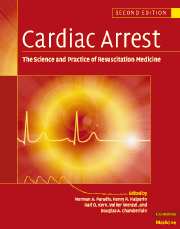Book contents
- Frontmatter
- Contents
- List of contributors
- Foreword
- Preface
- Part I Introduction
- Part II Basic science
- 3 Global cellular ischemia/reperfusion during cardiac arrest: critical stress responses and the postresuscitation syndrome
- 4 Genetics, genomics and proteomics in sudden cardiac death
- 5 Intracellular signaling during myocardial ischemia
- 6 Electrophysiology of ventricular fibrillation and defibrillation
- 7 The neuroendocrine response to global ischemia and reperfusion
- 8 Inflammatory and Immunologic responses to ischemia and reperfusion
- 9 Methodology of laboratory resuscitation research
- 10 The methodology of clinical resuscitation research
- 11 The special problem of consent for resuscitation research
- Part III The pathophysiology of global ischemia and reperfusion
- Part IV Therapy of sudden death
- Part V Postresuscitation disease and its care
- Part VI Special resuscitation circumstances
- Part VII Special issues in resuscitation
- Index
10 - The methodology of clinical resuscitation research
from Part II - Basic science
Published online by Cambridge University Press: 06 January 2010
- Frontmatter
- Contents
- List of contributors
- Foreword
- Preface
- Part I Introduction
- Part II Basic science
- 3 Global cellular ischemia/reperfusion during cardiac arrest: critical stress responses and the postresuscitation syndrome
- 4 Genetics, genomics and proteomics in sudden cardiac death
- 5 Intracellular signaling during myocardial ischemia
- 6 Electrophysiology of ventricular fibrillation and defibrillation
- 7 The neuroendocrine response to global ischemia and reperfusion
- 8 Inflammatory and Immunologic responses to ischemia and reperfusion
- 9 Methodology of laboratory resuscitation research
- 10 The methodology of clinical resuscitation research
- 11 The special problem of consent for resuscitation research
- Part III The pathophysiology of global ischemia and reperfusion
- Part IV Therapy of sudden death
- Part V Postresuscitation disease and its care
- Part VI Special resuscitation circumstances
- Part VII Special issues in resuscitation
- Index
Summary
This chapter is designed to provide a comprehensive, systematic account of the methods of conducting clinical research in resuscitation, in particular, how to set up and carry out a comprehensive and meaningful clinical trial. We will follow the natural conduct of a study, from designing the protocol through data collection to evaluation and interpretation. As an example of some of the difficulties and also the satisfactions of a job well done, in the Appendix we present Professor Wenzel's personal description of the trials and tribulations of determining the role of vasopressin in treatment for cardiac arrest.
Study design
Study objectives
Clinical research in cardiac arrest has developed slowly during the last few decades as compared with other disciplines. The objectives of completed, scheduled, or planned studies can roughly be divided into three categories: (1) epidemiology, i.e., collection of information on prevalence, chance and risks of clinical conditions that require resuscitation attempts; for example, anecdote in the Appendix, elevated endogenous vasopressin levels in survivors of cardiac arrest were found in previous epidemiological studies; (2) evaluation of established treatments and algorithms for resuscitation that are practiced with or without proof of efficacy; for example, in the anecdote, historical data on CPR with vasopressin were available; (3) randomized clinical trials performed to collect evidence on the efficacy and safety of established or new interventions or therapeutic strategies following cardiac arrest; for example, the anecdote describes a randomized clinical trial performed to gain evidence on the efficacy of vasopressin as compared to the established epinephrine injections during out-of-hospital CPR.
- Type
- Chapter
- Information
- Cardiac ArrestThe Science and Practice of Resuscitation Medicine, pp. 206 - 215Publisher: Cambridge University PressPrint publication year: 2007
- 1
- Cited by



